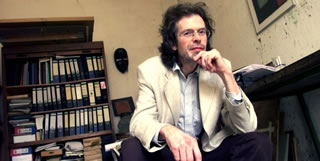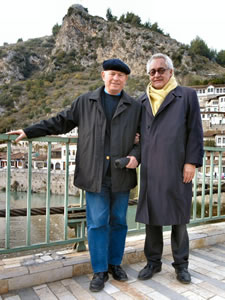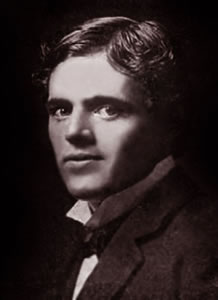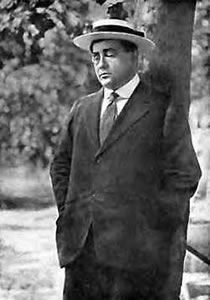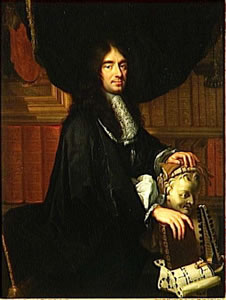De Nederlandse dichter, schrijver en columnist Cees van der Pluijm werd geboren op 12 januari 1954 te Radio Kootwijk (Gld.). Zie ook alle tags voor Cees van der Pluijm op dit blog.
Voorlopige bestemming 8
Er was een lied in jou, pathetisch wel
Maar toch, je zong je groot: je ging door roeien
En door ruiten, tot beide oren tuitten
En tot het glas uit elke sponning sprong
Vanuit de diepten kwam je, hard en fel
Een joch dat zich met alles ging bemoeien
En zich steeds onbewimpelder ging uiten
En diepte zocht in alles wat hij zong
Totdat het deksel haast je neusbeen brak
Jouw wereld bleek opeens de jouwe niet
Niets was van jou waar jij je neus in stak
De ander was je plotseling, je liet
Je overbluffen met het grootst gemak
Verstomd doorproefde je een oud verdriet
Uit: Portretsonnetten
17
Hij gaat niet meer naar feestjes of recepties
En als hij gaat, is hij als eerste weg
Bespaart zich hoogtepunten en decepties
Ontloopt vergadering en overleg
Begrafenis, verjaardag, presentatie
Als ’t even kan, dan weigert hij beslist
Bij voorkeur mijdt hij iedere roulatie
Vermoedend dat hij toch niet wordt gemist
Thuis vindt hij wat hij liefheeft op de tast
Zijn vrienden staan geordend in de kast
Hij kent in deze wereld heg en steg
Maar zelden heeft hij zich in hen vergist
Hij deelt zijn zelfgewild isolement
Alleen met hen, slechts aan zichzelf gewend
De Apostelenberg
Eens waren het er twaalf naar men beweert
Toen elf. En nu? En morgen? Volgend jaar?
Waar werd de norse Judas om gerooid
Die nu gemist wordt in de stille kring?
De berg, verraden voor de zilverling
Die Belvédère heet en het park nu tooit
Als hoger uitzichtpunt – als middelaar
Die dichter bij het hemelse verkeert –
Zwijgt nu in stille trots en telt zijn linden
Weet dat de Belvédère ook achterhaald
Is door de tijd en door de hoge bomen
Dat wie, met veel gehijg ten top gekomen
En later moeizaam weer ter aarde daalt
Zijn rust bij vrome linden kan hervinden
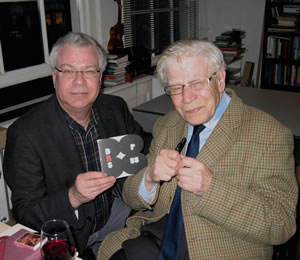
Cees van der Pluijm (Radio Kootwijk, 12 januari 1954)
Hier met Drs P. (rechts)
De Nederlandse dichter en schrijver Jacques Hamelink werd geboren op 12 januari 1939 in Driewegen, bij Terneuzen. Zie ook alle tags voor Jacques Hamelink op dit blog.
De Amstel buiten Amsterdam
De vlakke boordevolle breedgespreide vloeirivier
van bleekallure heeft een luider en een stiller zijde.
Bedden met Monetlelies bloeiend eierdooiergeel, langs
de geschoren grasoever rietgaten zonder witvisvissertjes.
In het lichtmidden van de waterweg rugbuigingen der halende
roeiers. Hof Vredelust zal zijn. Minikasteel. 17e-eeuws werk.
Het bric á brac voorbij aldoor het vlakke blinkende dat over
het plein van paardeweidjes, van tuinerijen door Ouderkerk voert.
Zintuigen
Na dagreizen slaap komt denken vermurwend
een diep mes langs achter in mijn ruggemerg
en haastig breek ik je binnen
en word geboren genezen gedragen hersteld
in een oogwenk
reuk: een lichtende ingeving
mijn huid wordt bevleugeld met tastzin
smaak komt als bloed in mijn mond staan
gehoor breekt door het netvlies van mijn oren
de morgen
en stijgt naar mijn ogen
tot ik niet meer tot ik bijna zien kan.

Jacques Hamelink (Terneuzen, 12 januari 1939)
De Japanse schrijver en vertaler Haruki Murakami werd geboren op 12 januari 1949 in Kyoto. Zie ook alle tags voor Haruki Murakami op dit blog.
Uit: Kafka on The Shore
“Cash isn’t the only thing I take from my father’s study when I leave home. I take a small, old gold lighter–I like the design and feel of it–and a folding knife with a really sharp blade. Made to skin deer, it has a five-inch blade and a nice heft. Probably something he bought on one of his trips abroad. I also take a sturdy, bright pocket flashlight out of a drawer. Plus sky blue Revo sunglasses to disguise my age.
I think about taking my father’s favorite Sea-Dweller Oyster Rolex. It’s a beautiful watch, but something flashy will only attract attention. My cheap plastic Cas
io watch with an alarm and stopwatch will do just fine, and might actually be more useful. Reluctantly, I return the Rolex to its drawer.
From the back of another drawer I take out a photo of me and my older sister when we were little, the two of us on a beach somewhere with grins plastered across our faces. My sister’s looking off to the side so half her face is in shadow and her smile is neatly cut in half. It’s like one of those Greek tragedy masks in a textbook that’s half one idea and half the opposite. Light and dark. Hope and despair. Laughter and sadness. Trust and loneliness. For my part I’m staring straight ahead, undaunted, at the camera. Nobody else is there at the beach. My sister and I have on swimsuits–hers a red floral-print one-piece, mine some baggy old blue trunks. I’m holding a plastic stick in my hand. White foam is washing over our feet.
Who took this, and where and when, I have no clue. And how could I have looked so happy? And why did my father keep just that one photo? The whole thing is a total mystery. I must have been three, my sister nine. Did we ever really get along that well? I have no memory of ever going to the beach with my family. No memory of going anywhere with them. No matter, though–there is no way I’m going to leave that photo with my father, so I put it in my wallet. I don’t have any photos of my mother. My father had thrown them all away.
After giving it some thought I decide to take the cell phone with me. Once he finds out I’ve taken it, my father will probably get the phone company to cut off service. Still, I toss it into my backpack, along with the adapter. Doesn’t add much weight, so why not. When it doesn’t work anymore I’ll just chuck it.”
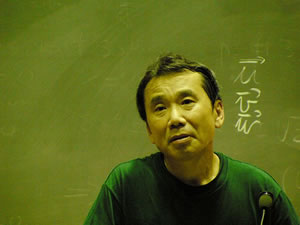
Haruki Murakami (Kioto, 12 januari 1949)
De Nederlandse dichter, schrijver en schilder Alain Teister (eig. Jacob Martinus Boersma werd geboren in Amsterdam op 12 januari 1932. Zie ook alle tags voor Alan Teister op dit blog.
Poëzie
Poëzie is, voor mij althans,
niet het vermoeid, roerdompig
droevig geroep om de gemiste kans.
Het is meer iets van op klompen
lopen, knarsen op het grint.
Wie dit vindt zal niet
mee kunnen komen met lome
en oude symbolen:
de bleke maan voor ’t bleke lief
is eerder week dan apocrief.
Meer dan op ’t volkje dat betreurt
en klankrijk zeurt
als grond tussen gelieven splijt
hou ik het op wat bijt,
en wel om ’t hardst.
Poëzie is meer
die barst zien, verifiëren,
en dat dan zeggen. Barst.
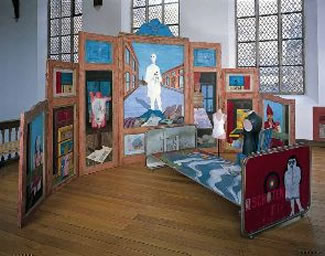
Alain Teister (12 januari 1932 – 6 februari 1979)
Zevenluik met bed, door Alain Teister (geen portret beschikbaar)
De Duitse dichter en schrijver Jakob Michael Reinhold Lenz werd geboren op 12 januari 1751 in Seßwegen. Zie ook alle tags voor Jakob Michael Reinhold Lenz op dit blog.
Süße Schmerzen meiner Seele
Süße Schmerzen meiner Seele,
Angenehme Pein!
Und doch muß bey dem Gequäle
Diese Seele heiter seyn,
Muß geliebt von allem, was auf Erden
Liebenswerth und heilig ist,
Seiner Sehnsucht Opfer werden
Wie mein Bruder! du es bist.
Ein Mädele jung
Ein Mädele jung ein Würfel ist,
Wohl auf den Tisch gelegen:
Das kleine Rösel aus Hennegau
Wird bald zu Gottes Tisch gehen.
Was lächelst so froh mein liebes Kind,
Dein Kreuz wird dir’n schon kommen.
Wenns heißt, das Rösel aus Hennegau
Hab nun einen Mann genommen.
O Kindlein mein, wie thuts mir so weh,
Wie dir dein Äugelein lachen,
Und wenn ich die tausend Thränlein seh,
Die werden dein Bäckelein waschen.
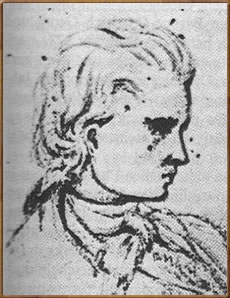
Jakob Michael Reinhold Lenz (12 januari 1751- 24 mei 1792)
Zie voor nog meer schrijvers van de 12e januari ook mijn vorige blog van vandaag.

